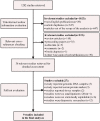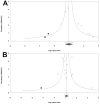The Prognostic Value of Circulating Cell-Free DNA in Colorectal Cancer: A Meta-Analysis
- PMID: 27326254
- PMCID: PMC4911878
- DOI: 10.7150/jca.14801
The Prognostic Value of Circulating Cell-Free DNA in Colorectal Cancer: A Meta-Analysis
Abstract
Background: Circulating cell-free DNA (cfDNA) is a promising candidate biomarker for detection, monitoring and survival prediction of colorectal cancer (CRC). However, its prognostic significance for patients with CRC remains controversial. To derive a precise estimation of the prognostic significance of cfDNA, a meta-analysis was performed.
Methods: We made a systematic search in data base of the Science Citation Index Embase and Pubmed for studies reporting prognostic data of cfDNA in CRC patients. The data of cfDNA on recurrences-free survival (RFS) and overall survival (OS) were extracted and measured in hazard rates (HRs) and 95% confident intervals (CIs). Subgroup analyses were carried out as well. Finally, the meta-analysis is accompanied with nine studies including 19 subunits.
Results: The pooled HRs with 95% CIs revealed strong associations between cfDNA and RFS (HR [95%CI]=2.78[2.08-3.72], I(2)=32.23%, n=7) along with OS (HR [95%CI]=3.03[2.51-3.66], I(2)=29.24%, n=12) in patients with CRC. Entire subgroup analyses indicated strong prognostic value of cfDNA irrespective tumor stage, study size, tumor markers, detection methods and marker origin.
Conclusions: All the results exhibits that appearance of cfDNA in blood is an indicator for adverse RFS and OS in CRC patients.
Keywords: Plasma DNA; cell-free DNA; colorectal cancer; meta-analysis.; prognosis.
Conflict of interest statement
Competing Interests: The authors declare that they have no potential competing interests.
Figures
Similar articles
-
Impact of residual disease as a prognostic factor for survival in women with advanced epithelial ovarian cancer after primary surgery.Cochrane Database Syst Rev. 2022 Sep 26;9(9):CD015048. doi: 10.1002/14651858.CD015048.pub2. Cochrane Database Syst Rev. 2022. PMID: 36161421 Free PMC article. Review.
-
Can a Liquid Biopsy Detect Circulating Tumor DNA With Low-passage Whole-genome Sequencing in Patients With a Sarcoma? A Pilot Evaluation.Clin Orthop Relat Res. 2025 Jan 1;483(1):39-48. doi: 10.1097/CORR.0000000000003161. Epub 2024 Jun 21. Clin Orthop Relat Res. 2025. PMID: 38905450
-
Anti-angiogenic therapy for high-grade glioma.Cochrane Database Syst Rev. 2018 Nov 22;11(11):CD008218. doi: 10.1002/14651858.CD008218.pub4. Cochrane Database Syst Rev. 2018. PMID: 30480778 Free PMC article.
-
Prognostic models for predicting clinical disease progression, worsening and activity in people with multiple sclerosis.Cochrane Database Syst Rev. 2023 Sep 8;9(9):CD013606. doi: 10.1002/14651858.CD013606.pub2. Cochrane Database Syst Rev. 2023. PMID: 37681561 Free PMC article. Review.
-
Undernutrition as a risk factor for tuberculosis disease.Cochrane Database Syst Rev. 2024 Jun 11;6(6):CD015890. doi: 10.1002/14651858.CD015890.pub2. Cochrane Database Syst Rev. 2024. PMID: 38860538 Free PMC article. Review.
Cited by
-
Circulating cell free DNA as the diagnostic marker for colorectal cancer: a systematic review and meta-analysis.Oncotarget. 2018 May 11;9(36):24514-24524. doi: 10.18632/oncotarget.25314. eCollection 2018 May 11. Oncotarget. 2018. PMID: 29849957 Free PMC article.
-
High Intra- and Inter-Tumoral Heterogeneity of RAS Mutations in Colorectal Cancer.Int J Mol Sci. 2016 Dec 1;17(12):2015. doi: 10.3390/ijms17122015. Int J Mol Sci. 2016. PMID: 27916952 Free PMC article.
-
The Position of Circulating Tumor DNA in the Clinical Management of Colorectal Cancer.Cancers (Basel). 2023 Feb 17;15(4):1284. doi: 10.3390/cancers15041284. Cancers (Basel). 2023. PMID: 36831626 Free PMC article. Review.
-
Role of Circulating Tumor DNA in Gastrointestinal Cancers: Current Knowledge and Perspectives.Cancers (Basel). 2021 Sep 22;13(19):4743. doi: 10.3390/cancers13194743. Cancers (Basel). 2021. PMID: 34638228 Free PMC article. Review.
-
Microbial markers in colorectal cancer detection and/or prognosis.World J Gastroenterol. 2018 Jun 14;24(22):2327-2347. doi: 10.3748/wjg.v24.i22.2327. World J Gastroenterol. 2018. PMID: 29904241 Free PMC article. Review.
References
-
- Siegel RL, Miller KD, Jemal A. Cancer statistics, 2015. CA: a cancer journal for clinicians. 2015;65:5–29. - PubMed
-
- Torre LA, Bray F, Siegel RL, Ferlay J, Lortet-Tieulent J, Jemal A. Global cancer statistics, 2012. CA: a cancer journal for clinicians. 2015;65:87–108. - PubMed
-
- O'Connell JB, Maggard MA, Ko CY. Colon cancer survival rates with the new American Joint Committee on Cancer sixth edition staging. Journal of the National Cancer Institute. 2004;96:1420–5. - PubMed
-
- Moon SH, Kim DY, Park JW, Oh JH, Chang HJ, Kim SY. et al. Can the new American Joint Committee on Cancer staging system predict survival in rectal cancer patients treated with curative surgery following preoperative chemoradiotherapy? Cancer. 2012;118:4961–8. - PubMed
-
- Gion M, Mione R, Barioli P, Dittadi R. Dynamic use of tumor markers, rationale-clinical applications and pitfalls. Anticancer research. 1996;16:2279–84. - PubMed
LinkOut - more resources
Full Text Sources
Other Literature Sources




